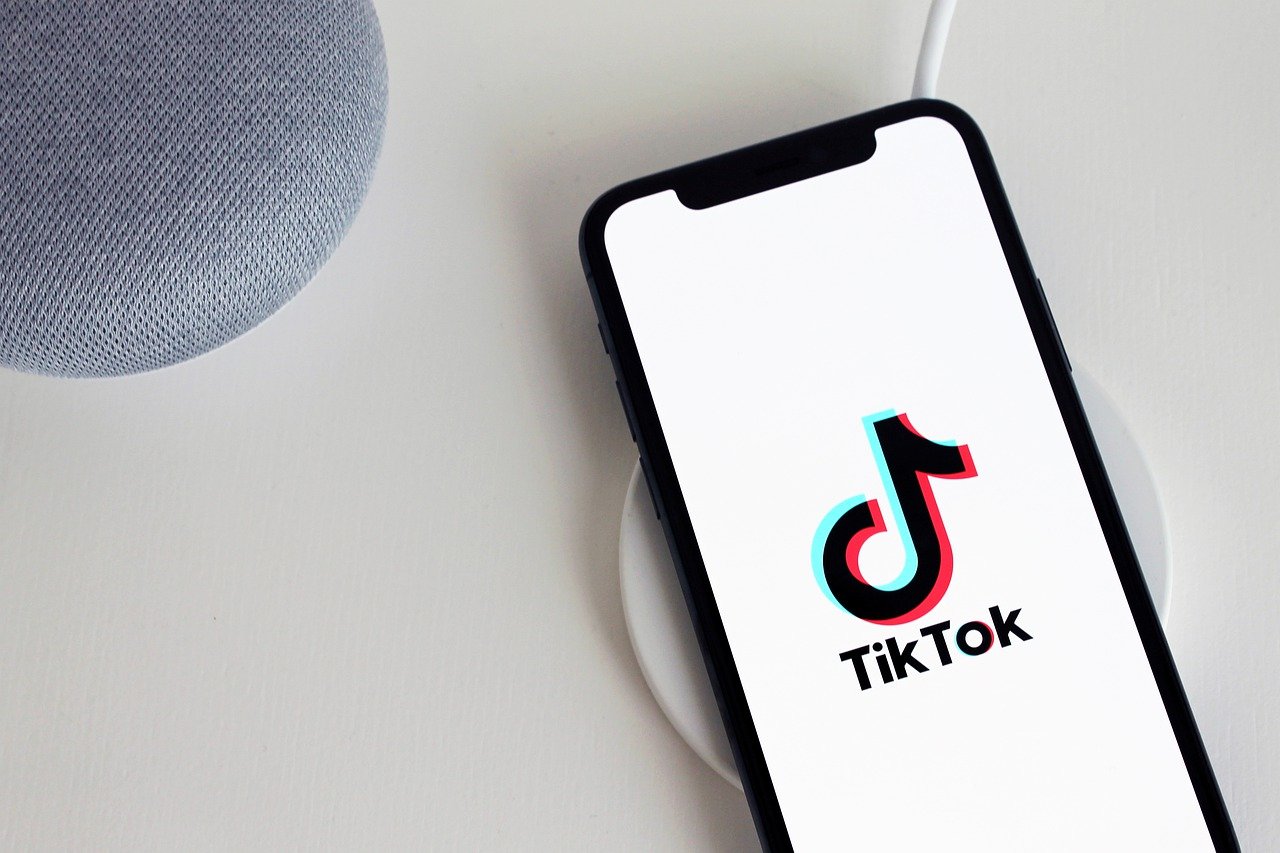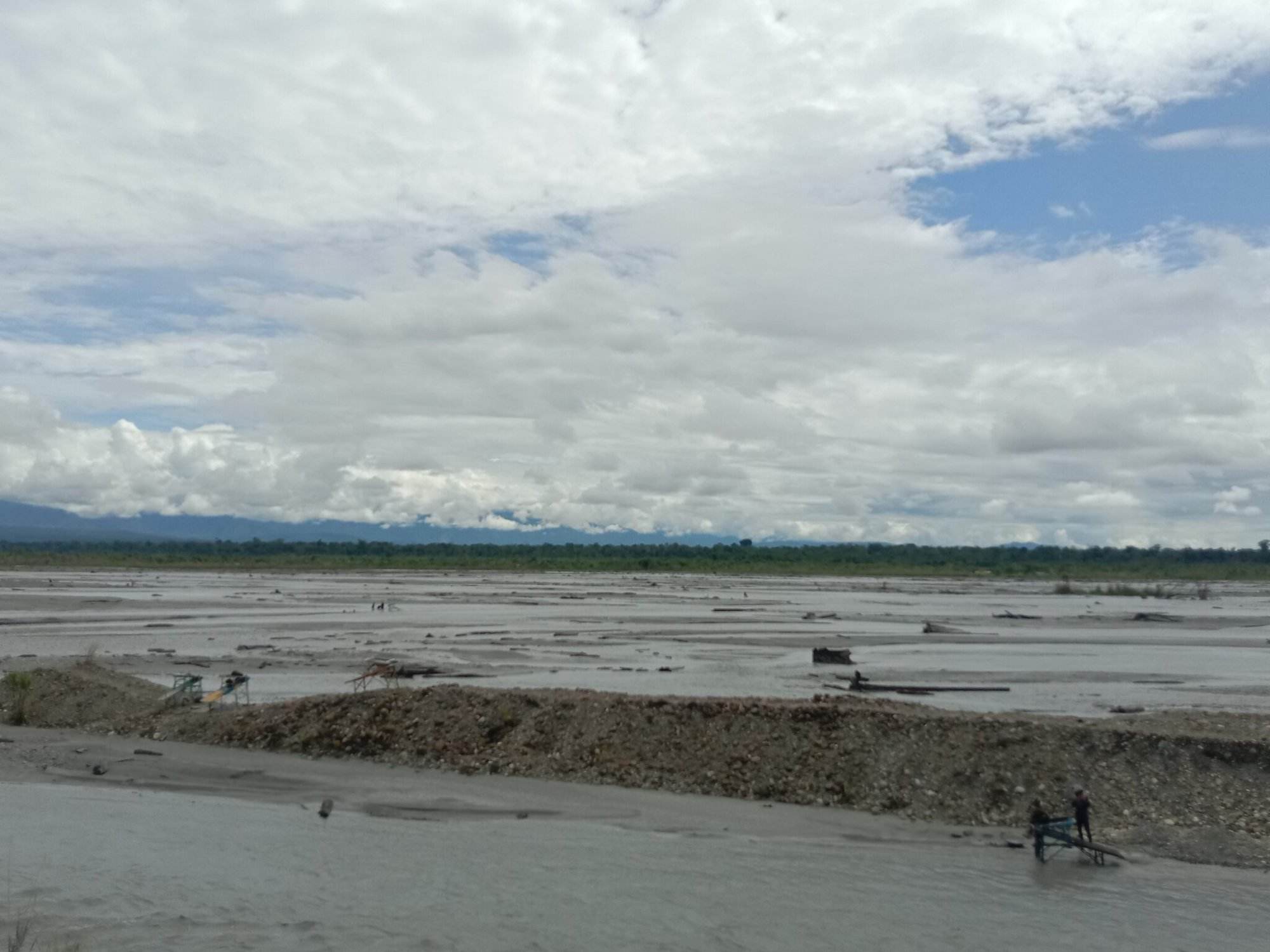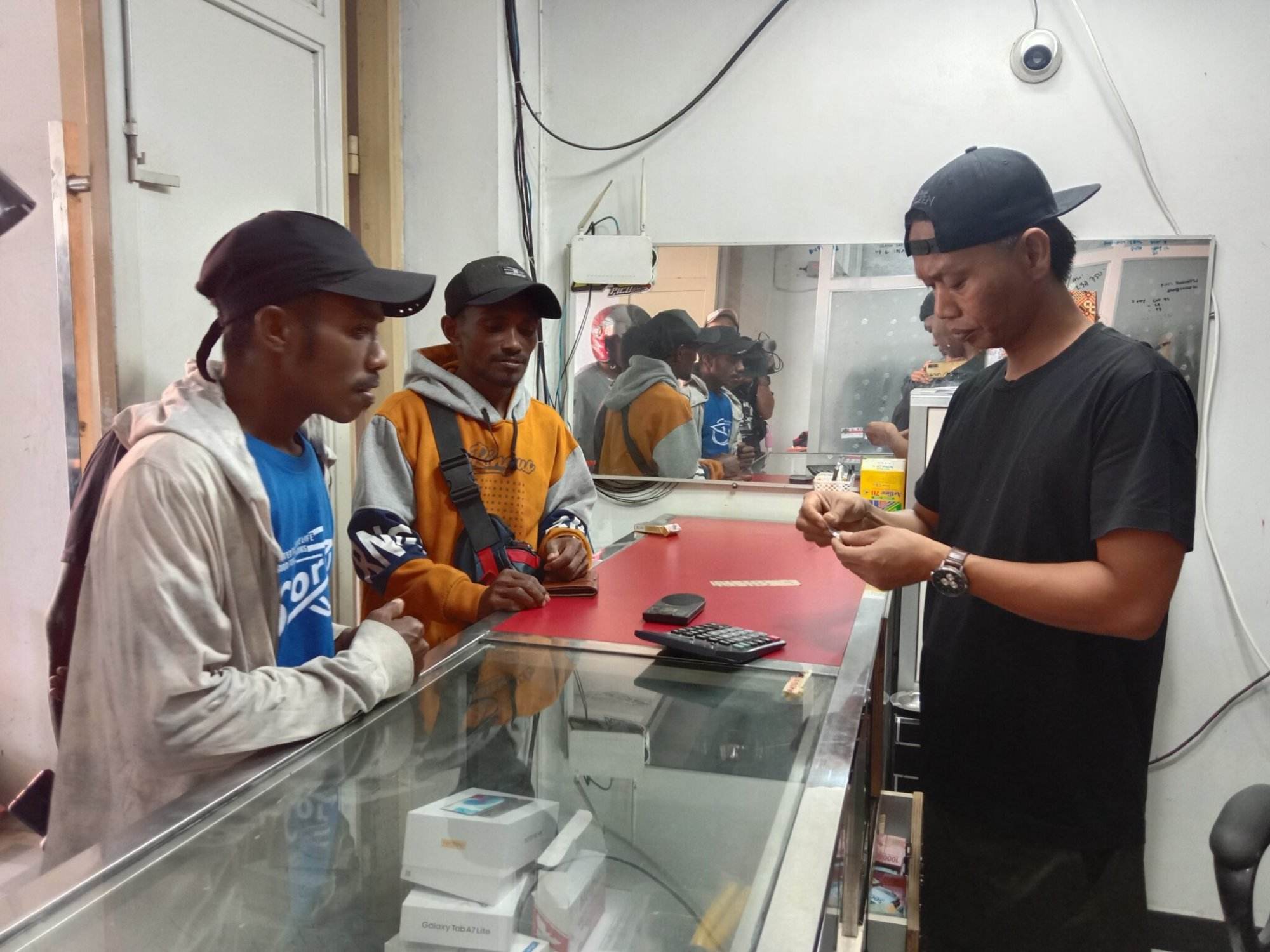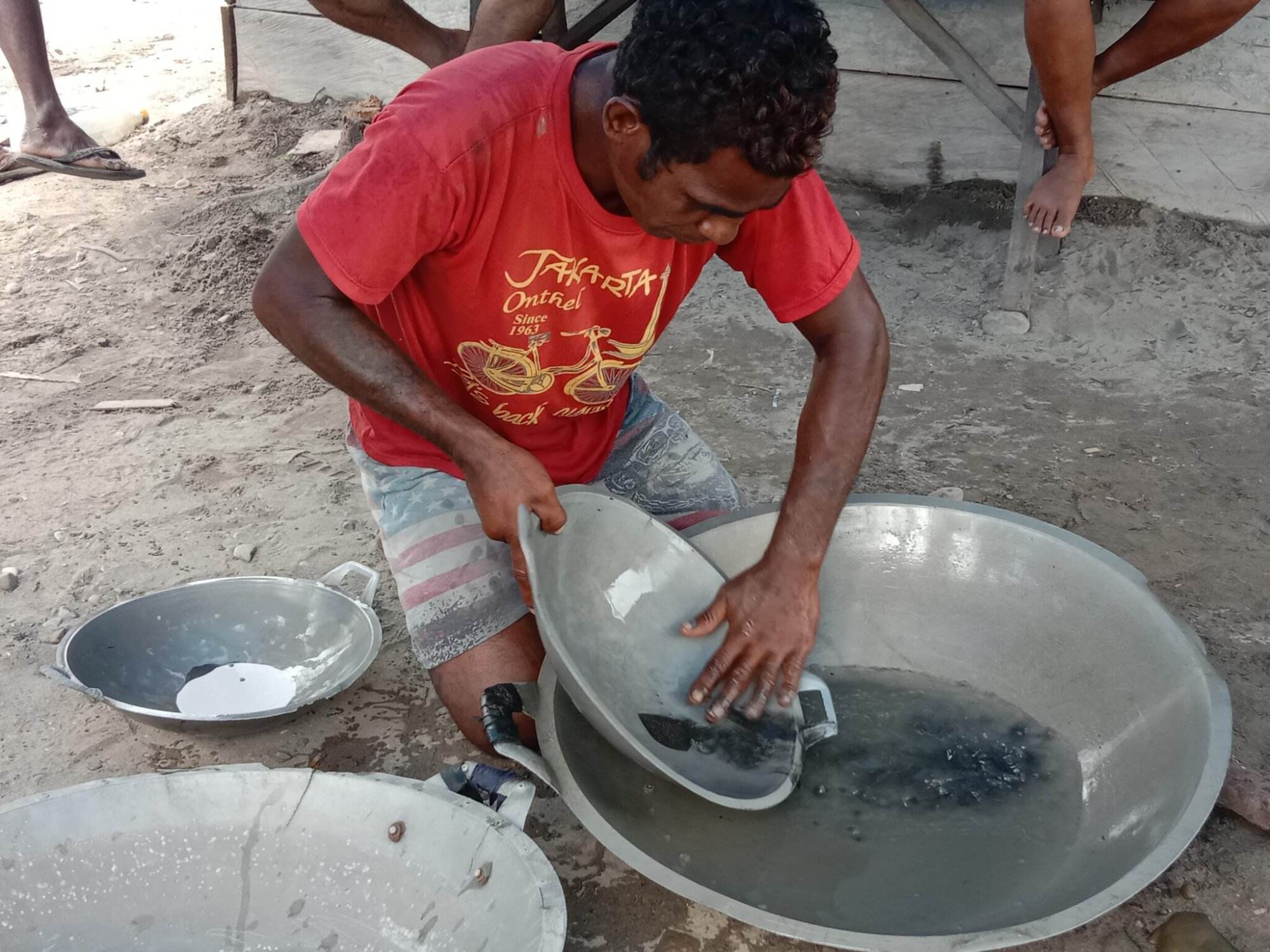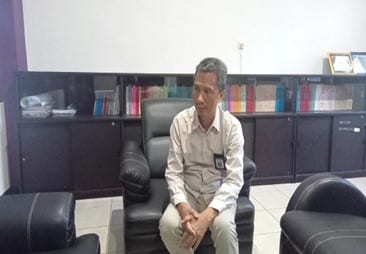Jayapura, Jubi – Research by four civil society institutions indicates that efforts to obscure information about Papua have spread to the social media platform TikTok. This has drowned out the opinions of some indigenous Papuans who reject Special Autonomy for Papua or the division of Papua. The research found that “misinformation agents” on TikTok often use the hashtag #YouthCreativeHub to expand the interaction of their posts.
The study was conducted by Internews, Indonesia Corruption Watch, SAFEnet, and the Centre for Information Resilience. It involved tracing various posts that praised the success of Special Autonomy for Papua or the division of Papua on TikTok.
The investigation is noteworthy because TikTok is a relatively new social media platform with a more closed ecosystem than others, making it difficult for researchers to dissect and map the origins of various trending topics on TikTok. Analyzing trending topics on TikTok is important, considering its large youth user base—exceeding 100 million users in Indonesia.
One SAFEnet researcher involved in the study explained that the research conducted from August to October 2023 traced the origins of hashtags related to Special Autonomy for Papua or the division of the Papua Province. Initially, the tracked hashtags were #DOBPapua and #OtsusPapua. The researchers also traced the origins of more general hashtags such as #Papua #PapuaIndonesia and #KKBPapua.
The research concluded that the positive sentiment towards the implementation of Special Autonomy (Otsus) in Papua on TikTok is not natural, as it is propagated by certain accounts that interact with each other to manipulate TikTok’s algorithm. In short, the positive sentiments about Special Autonomy for Papua or the division of Papua on TikTok are engineered so that negative sentiments about the matter do not become trending and expose TikTok users.
According to SAFEnet researchers, two TikTok users who have recently become the focus of the study are ariandi6031 and andisa256. The activities of both accounts are very similar and they frequently interact with each other.
“These accounts often upload [content about Special Autonomy for Papua] earliest compared to a number of contents later uploaded collectively [by other TikTok users]. However, we did not find their true identities,” they said.
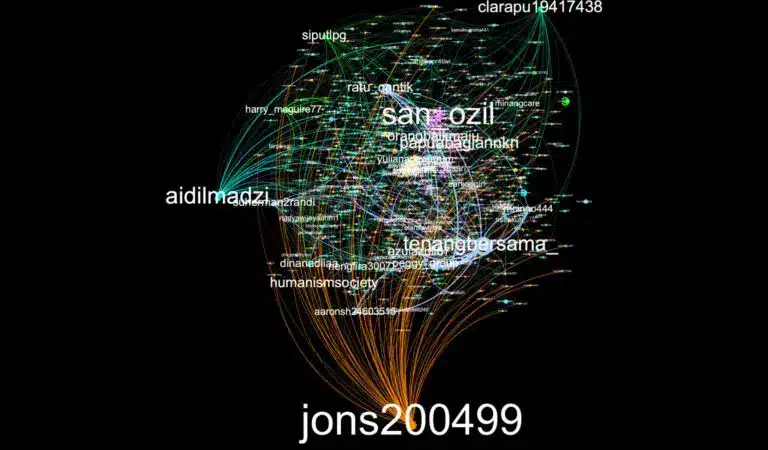
This Gephi visualization shows that large amplified accounts with many connections (interactions) are larger in size
bigger picture – Screen Shot of Disinformation Investigation Report on the Success of West Papua Special Autonomy
Fake accounts?
The research also concluded that interactions with various posts praising Special Autonomy for Papua were carried out by accounts suspected to be fake. This suspicion arises because several accounts use names similar to those generated by account generators. Instead of using profile pictures that show their identities, various “Otsus accounts” on TikTok use images generated by artificial intelligence.
Several accounts also frequently repost content praising Special Autonomy for Papua. The researchers from the four institutions concluded that these accounts exchanged content through WhatsApp messaging services and reposted their friends’ content. This conclusion is based on the timing of uploads of the same or similar content.
TikTok content praising Special Autonomy for Papua also often mimics specific news headlines. The researchers found several pieces of content using news headlines from various media outlets as their descriptions.
Interestingly, various accounts involved in praising Special Autonomy and infrastructure development in Papua are often engaged in interactions among themselves. Accounts like andisa256 and ariandi6031, for example, consistently interact with each other.
There is also suspicion on fake conversations. This suspicion arises because various comments are posted by accounts with characteristics of “fake accounts.” The researchers cited posts from andisa256 and ariandi6031 with descriptions such as ‘Video WhatsApp 13-06-2023 at 33.07.46’. These posts receive tens to hundreds of comments from only a few accounts.
Those accounts do not have many posts or have never uploaded any content on TikTok. Another peculiarity is that various “commenting accounts” also post their comments simultaneously. This raises suspicions that these accounts are bots.
Furthermore, the comments or narratives are often the same. In short, the “misinformation agents” are not only those TikTok users who exchange content but also those who exchange comments.
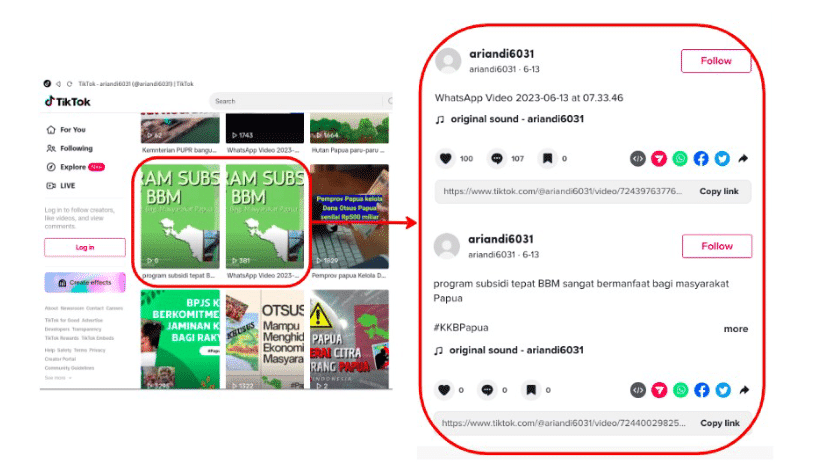
from the previous one ‘WhatsApp Video 13-06-2023 at 33.07.46’. This shows that the source comes from
from WhatsApp
The #YouthCreativeHub hashtag
The research also found interesting behavior in which these users often use hashtags #DOBPapua, #OtsusPapua, #Papua, #Papuaindonesia, and simultaneously the #YouthCreativeHub hashtag.
This caught the attention of the researchers because the hashtag is synonymous with the existence of the Papua Youth Creative Hub. Moreover, Papua Youth Creative Hub was founded by Billy Mambrasar, a special staff member of President Joko Widodo, and its existence was officially inaugurated by Jokowi.
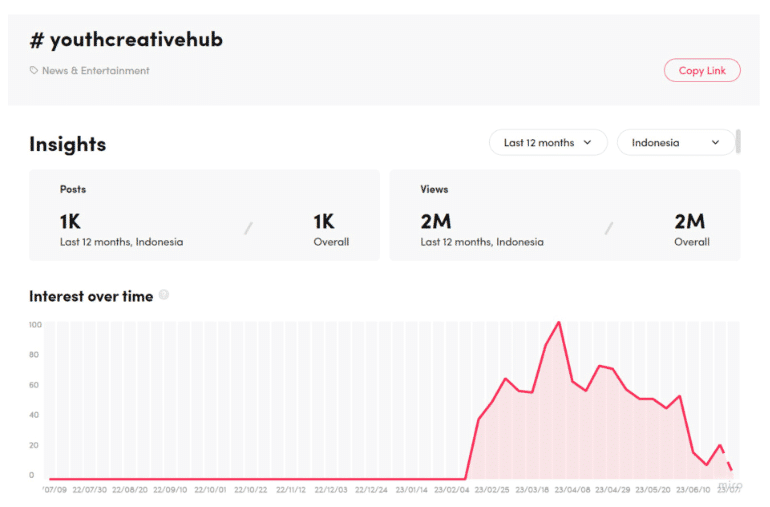
However, according to SAFEnet researchers, they found no evidence that the users are directly affiliated with the Papua Youth Creative Hub (PYCH).
“It’s possible that these users are riding the wave of the #YouthCreativeHub hashtag. Riding the wave is one way to expand the interaction of content. Though there is no direct evidence of the connection between these users and the Papua Youth Creative Hub,” said a SAFEnet researcher.
Nevertheless, they concluded that the suspicious accounts repeatedly used the PYCH in their efforts to obscure information about Papua. One indication is that if the political situation in Papua heats up due to demonstrations, for example, these suspicious accounts will vigorously upload various content with positive sentiments about Special Autonomy for Papua or infrastructure development in Papua and insert the #YouthCreativeHub hashtag in their descriptions.
“We conclude that the #YouthCreativeHub hashtag is the engine of the government’s campaign success by rallying TikTok users in Papua and SME activists in the field,” they said.
“The campaign is simple. ‘Let’s not talk about Papua independence, but there’s a new hangout spot in Papua.’ Our conclusion is that people who often upload misinformation content about the New Autonomous Region and Special Autonomy for Papua often use the #YouthCreativeHub hashtag,” they said.
This is not the first time. The use of fake accounts and networks like this infiltrating social media platforms to spread information has occurred before. Twitter and Facebook once removed more than 80 accounts following a Reuters investigation linking them to a network of news sites supported by the Indonesian military that published pro-government propaganda about the turbulent Papua region.
These two social media platforms deleted hundreds of accounts, pages, and groups in Indonesia from their social networks after finding that they were associated with online groups spreading hate speech and fake news. They spread deceptive messages through hidden page and account networks to promote narratives that often divide key public debate issues in Indonesia. A similar situation was also identified in this study.
Billy Mambrasar: PYCH does not deal with politics
The founder of Papua Youth Creative Hub (PYCH), Billy Mambrasar, said he had no knowledge of the use of the hashtag #YouthCreativeHub by several accounts suspected of obscuring information about Papua. Mambrasar even admitted confusion with the researchers’ findings because Papua Youth Creative Hub has never conducted online campaigns and is more involved in offline activities outside of politics.
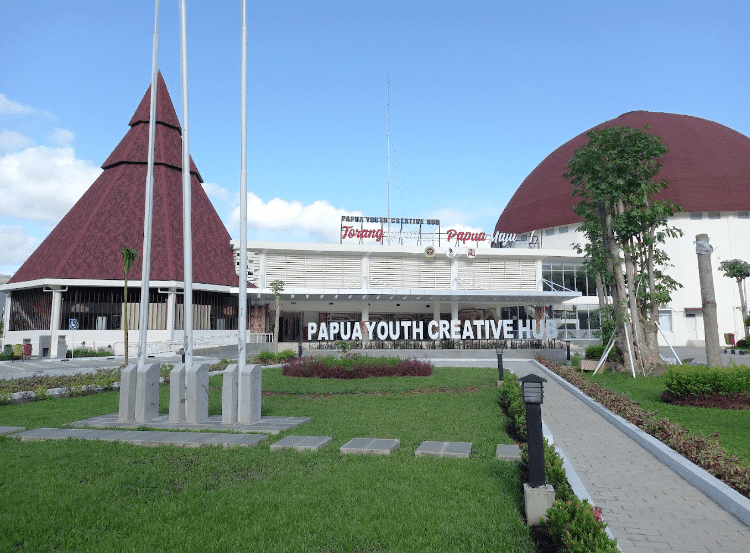
“We don’t have online activities. Our activities include SME training, providing training for Papuan children involved in agriculture, and showcasing Papuan craftsmanship. I only focus on empowerment, and our activities are more focused on offline activities,” he said.
Mambrasar also dismissed the allegation that accounts uploading content praising Special Autonomy for Papua or the division of Papua are hired influencers by PYCH. “We don’t have a budget to pay influencers,” he said. (*)



